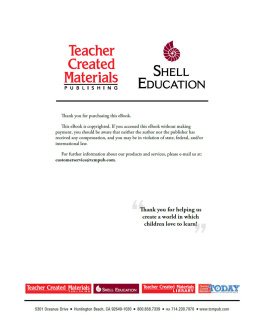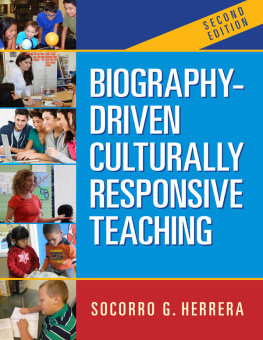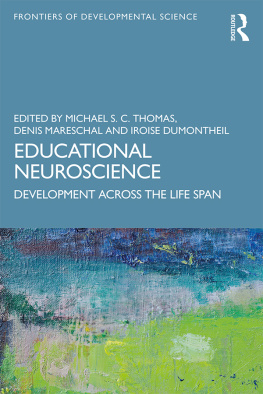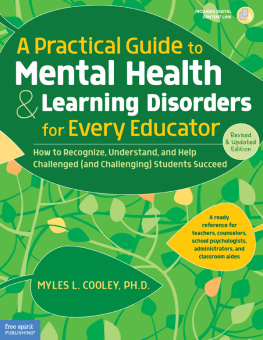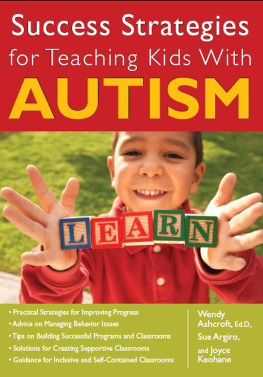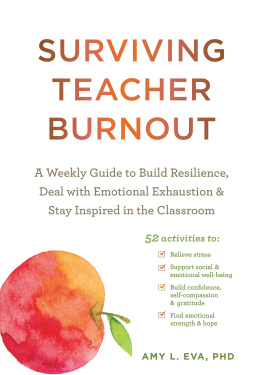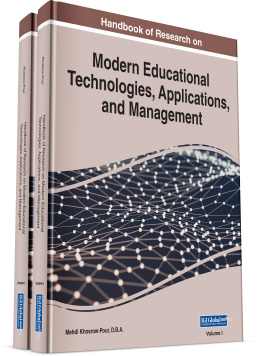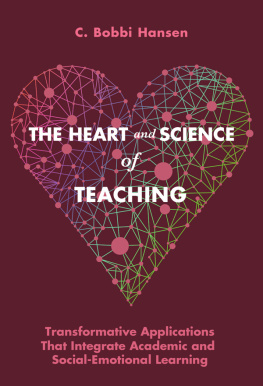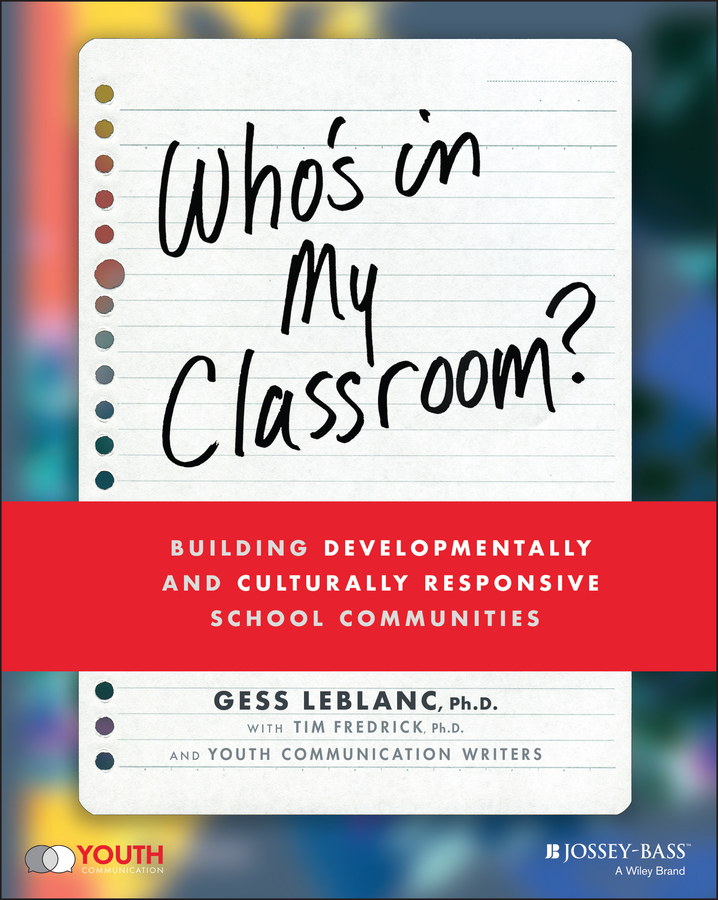
Table of Contents
Guide
Pages
Who's in My Classroom?
Building Developmentally and Culturally Responsive School Communities
Gess LeBlanc, Ph.D.
with Tim Fredrick, Ph.D., and
Youth Communication Writers
Keith Hefner and Maria Luisa Tucker, co-editors

Copyright 2021 Youth Communication / New York Center, Inc. All rights reserved.
Jossey-Bass
A Wiley Imprint
111 River St, Hoboken, NJ 07030
www.josseybass.com
No part of this publication may be reproduced, stored in a retrieval system, or transmitted in any form or by any means, electronic, mechanical, photocopying, recording, scanning, or otherwise, except as permitted under Section 107 or 108 of the 1976 United States Copyright Act, without either the prior written permission of the Publisher, or authorization through payment of the appropriate per-copy fee to the Copyright Clearance Center, Inc., 222 Rosewood Drive, Danvers, MA 01923, phone +1 978 750 8400, fax +1 978 750 4470, or on the web at www.copyright.com. Requests to the Publisher for permission should be addressed to the Permissions Department, John Wiley & Sons, Inc., 111 River Street, Hoboken, NJ 07030, phone + 1 201 748 6011, fax +1 201 748 6008, or online at www.wiley.com/go/permissions.
Limit of Liability/Disclaimer of Warranty: Although the publisher and author have used their best efforts in preparing this book, they make no representations or warranties with respect to the accuracy or completeness of the contents of this book and specifically disclaim any implied warranties of merchantability or fitness for a particular purpose. No warranty may be created or extended by sales representatives or written sales materials. The advice and strategies contained herein may not be suitable for your situation. You should consult with a professional where appropriate. Neither the publisher nor author shall be liable for any loss of profit or any other commercial damages, including but not limited to special, incidental, consequential, or other damages.
Jossey-Bass books and products are available through most bookstores. To contact Jossey-Bass directly, call our Customer Care Department within the U.S. at 8009567739, outside the U.S. at +1 317 572 3986, or fax +1 317 572 4002.
Wiley also publishes its books in a variety of electronic formats and by print-on-demand. Some material included with standard print versions of this book may not be included in e-books or in print-on-demand. If this book refers to media such as a CD or DVD that is not included in the version you purchased, you may download this material at http://booksupport.wiley.com. For more information about Wiley products, visit www.wiley.com.
Library of Congress Cataloging-in-Publication Data is available. LCCN: 2021027851
ISBN 9781119824138 (paperback), 9781119824145 (ebook), 9781119824152 (ebook)
Cover image: Notepad Paper Hudiemm/Getty Images
Cover design: Paul McCarthy
FIRST EDITION
Introduction
Ms. Lombardo took the time to get to know me. She would talk to me about the books I was reading to connect with me. I gradually began to feel safe around her. I still don't know how she was able to see the loneliness that so many before her had failed to notice, but I do know that she was determined to make it right. She was committed to being that one person in my life who I could rely on and confide in.
Anonymous Youth Communication teen writer, from the story My Teacher Saved Me from Solitude
THERE'S AN adage that says that you can't teach what you don't know. While the origins of the quote appear to be unknown, the idea is that effective teachers must know their subject matter.
But knowing your subject matter is just one element of good teaching. I wrote this book because I believe you also can't teach WHO you don't know.
Over the past few decades, researchers in education and psychology have found convincing evidence that learning is also strongly influenced by students' sense of who they are and their beliefs in their ability to learn. It is also influenced by their experiences at home and their level of cognitive and emotional development. This research has important implications for how we prepare teachers to enter the field and how we support them during their careers. It helps us rethink our notions of what it means to be an effective teacher. Yes, we need to know our subject matter. But getting to know students is also crucial to our effectiveness as educators.
I'm a developmental psychologist. Over the past 20 years, I've worked as a faculty member in the School of Education at Hunter College of the City University of New York where I support the preparation of teachers, school leaders, and counselors. During that time, I've become increasingly interested in how children's experiences inside and outside the classroom influence their learning and engagement in school. As a Black man and father of two Black sons, I've focused especially on how those experiences influence the school engagement of BIPOC (Black, Indigenous, and people of color) youth and other young people who may feel unseen in school, including LGBTQ+ students and youth who live in poverty.
As an expert in the field of child and adolescent development, I've worked as an educational consultant at the state level, and with urban, suburban, and rural school districts. My focus has been helping teachers design lessons that address students' cognitive, physical, social, and emotional needs in ways that also demonstrate an understanding of their students' lives and cultures.
One of the most rewarding features of my work with teachers and schools is talking with students about how they're experiencing school. We talk about what helps them learn and obstacles that make learning more difficult. We also discuss what makes a good teacher. I've had the opportunity to ask these questions of more than 1,000 children ranging from age 8 to 18. I've never had a child tell me that their teacher was a good teacher because they knew a lot about a subject area like math or English. What they tell me is that good teachers get to know them. They make them feel like they're cared for. They make lessons interesting and engaging by connecting them to students' lives.
It's a good sign that students expect teachers to know their subject matter. But for students, that's not enough. Good teachers do two things at once: We work to understand our students while simultaneously helping them to understand the content that we are charged with teaching.
But with the increasing ethnic, racial, and linguistic diversity in schools throughout the United States, the challenge of knowing our students is ever growing: It's virtually certain that we will have students in our classroom whose life experiences are very different from our own. These differences can present challenges to getting to know them. But they also present opportunities to learn about others, and ourselves, in ways that make us more effective teachers and make teaching more interesting. But what does it mean to know students and why is knowing students so important?
Once upon a time, many teachers and students shared similar racial, religious, and socio-economic backgrounds, which made it easier for teachers to know their students. That's important because academic research suggests that teachers are more effective when they have knowledge of their students' cultural backgrounds and how they develop cognitively, physically, socially, and emotionally. As the evidence base has grown, the field of teacher education and professional development has increasingly emphasized the importance of developmentally appropriate and culturally responsive teaching.
Next page

